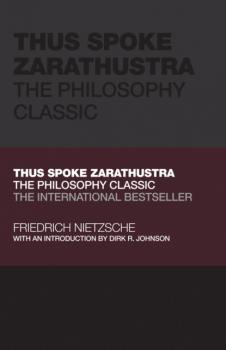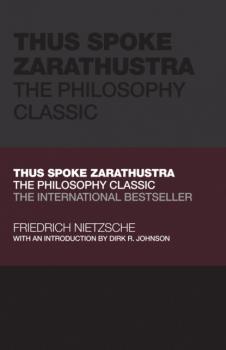Friedrich Nietzsche
Список книг автора Friedrich NietzscheThus Spoke Zarathustra
A startling and thought-provoking work from one of the most powerful philosophers in the Western canon Thus Spoke Zarathustra: A Philosophy Classic, is Friedrich Nietzsche’s classic masterpiece of philosophy and literature. Nietzsche writes from the perspective of Zarathustra who, after years of meditation, has come down from a mountain to provide his wisdom to an unsuspecting world. He offers enduring observations on God, the Übermensch, the will to power, and the nature of human beings. This deluxe hardback Capstone edition includes an insightful introduction from leading Nietzsche scholar Dirk R. Johnson Perfect for students and scholars of philosophy, literature and history, Thus Spoke Zarathustra: A Philosophy Classic belongs in the libraries of anyone interested in the philosophy of Nietzsche and in his powerful explorations of God, life, power, and humanity.
Beyond Good and Evil
A caustic criticism of nearly every philosophic predecessor and a challenge of traditionally held views on right and wrong, Friedrich Nietzsche's Beyond Good and Evil paved the way for modern philosophical thought. Through nearly three hundred transformative aphorisms, Nietzsche presents a worldview in which neither truth nor morality are absolutes, and where good and evil are not opposites but counterparts that stem from the same desires.
Beyond Good and Evil was a foundational text for early twentieth-century thinkers, including philosophers, psychologists, novelists, and playwrights. Today's readers will delight in Nietzsche's pithy wit and irony while gaining a deeper understanding of his core ideology.
Schopenhauer como educador
Pocos textos como el de esta tercera Intempestiva podrían iluminar mejor las raíces de la tarea que Nietzsche escogió como propia en fecha ya muy temprana. «¿Qué se le exige a un filósofo, en primera y última instancia? Superar en sí mismo su propio tiempo y volverse intempestivo. ¿Con qué ha de sostener su más dura batalla? Con aquello por lo cual, justamente, es hijo de su tiempo.»
«Schopenhauer como educador» es, en efecto, un poderoso alegato contra la decadencia de la cultura y de la vida modernas y la perversión académica de la filosofía. Pero precisamente por eso es también el documento deslumbrante de uno de los momentos de mayor fuerza inaugural de la larga confrontación nietzscheana con la tradición occidental, esa tradición metafísica, moral y religiosa, la nuestra, a cuya genealogía histórica y psicológica dedicó el filósofo lo mejor de su obra.
Colección integral de Friedrich Nietzsche
Este ebook presenta «Colección integral de Friedrich Nietzsche» con un sumario dinámico y detallado. Friedrich Nietzsche (1844-1900), escritor y filósofo alemán, es una de las figuras más relevantes de la filosofía moderna. Cuestionó todos los valores morales tradicionales e introdujo conceptos como la voluntad de poder, el superhombre, el eterno retorno y el espíritu dionisíaco. Fascinado por las posibilidades del arte y de la música, y gran admirador del Richard Wagner, Nietzsche criticó la tradición judeo-cristiana, e, influido por Schopenhauer, se acercó a un nihilismo que rechazaba los trascendentales morales y espirituales. Tras su ruptura con Wagner por el estreno de su ópera Parsifal, se vuelve cada vez más crítico para con el arte y la metafísica, desarrollando sus ideas en Así habló Zarathustra. Diversas enfermedades motivaron su reclusión en sanatorios para, finalmente, retirarse a vivir junto a su hermana hasta su muerte. Tabla de contenidos: De mi vida. Escritos autobiográficos de juventud Así habló Zaratustra. Un libro para todos y para ninguno Más allá del bien y del mal. Preludio a una filosofía del futuro El Anticristo
Le Gai Savoir
Le Gai Savoir est un ouvrage de Friedrich Nietzsche, publié en 1882, sous le titre original Die fröhliche Wissenschaft, la gaya scienza. Dans sa préface à la seconde édition, Nietzsche contextualise son projet : de ses provenances toutes de soupçons et de souffrances morales, faisant explicitement référence à une certaine appréhension de la psychologie en tant que libératrice des affres de la maladie, à l'antiquité grecque qu'il affectionne particulièrement pour ce que les Grecs anciens auraient été, de son avis philologique, " superficiels… par profondeurs ! ", en passant par la conjecture que les personnes de sa trempe sont destinées à vivre une existence tragique, ressentie comme délivrance, par opposition " au troupeau ", qui se nourrirait de certitudes satisfaites. Nietzsche introduit son ouvrage avec la citation suivante: J'habite ma propre demeure, Jamais je n'ai imité personne, Et je me ris de tous les maîtres Qui ne se moquent pas d'eux-mêmes. Écrit au-dessus de ma porte
Así habló Zaratustra
Este ebook presenta «Así habló Zaratustra» con un sumario dinámico y detallado. La obra contiene las principales ideas de Nietzsche, expresadas de forma poética: está compuesta por una serie de relatos y discursos que ponen en el centro de atención algunos hechos y reflexiones de un profeta llamado Zaratustra, personaje inspirado en su tocayo fundador del Zoroastrismo. Compuesta principalmente por episodios más o menos independientes, sus historias pueden leerse en cualquier orden a excepción de la cuarta parte de la obra, pues son un cúmulo de ideas y relatos menores independientes que conforman un solo relato general. Friedrich Wilhelm Nietzsche (1844 – 1900) fue un filósofo, poeta, músico y filólogo alemán, considerado uno de los pensadores contemporáneos más influyentes del siglo XIX.
Más allá del bien y del mal
Este ebook presenta «Más allá del bien y del mal» con un sumario dinámico y detallado. Publicado en 1886 a costa del mismo autor, el libro no recibió en un principio mucha atención. Nietzsche atacaba en él lo que consideraba vacuidad moral de los pensadores de su siglo, falta de sentido crítico alguno de los autodenominados moralistas y su pasiva aceptación de la moral heredada judeo-cristiana. Más allá del bien y del mal recorre todos los temas fundamentales de la madurez filosófica de Nietzsche y en parte puede ser leído como un desarrollo, en términos más directos, de las ideas que el autor ya había propuesto en un sentido más metafórico en Así habló Zaratustra (Also Sprach Zarathustra). Friedrich Wilhelm Nietzsche (1844 – 1900) fue un filósofo, poeta, músico y filólogo alemán, considerado uno de los pensadores contemporáneos más influyentes del siglo XIX.
Ecce Homo
"Ecce homo. Wie man wird, was man ist" ist vor allem eine autobiografische Schrift, die Nietzsche von 1888 bis zu seinem Zusammenbruch Anfang 1889 aufschrieb und zum ersten Mal 1908 posthum veröffentlicht wurde. Rückblickend deutet Nietzsche in Ecce homo seine philosophischen Schriften. Die App enthält einleitende, erklärende Texte, eine Kurzbiografie und Hinweise auf weiterführende Informationen. 100% Sachbuchklassiker: vollständig, kommentiert, relevant. Durch Einfügen der Seitenzahlen des Originals ist auch das Digitalisat zitier- und für die wissenschaftliche oder schulische Arbeit nutzbar.









